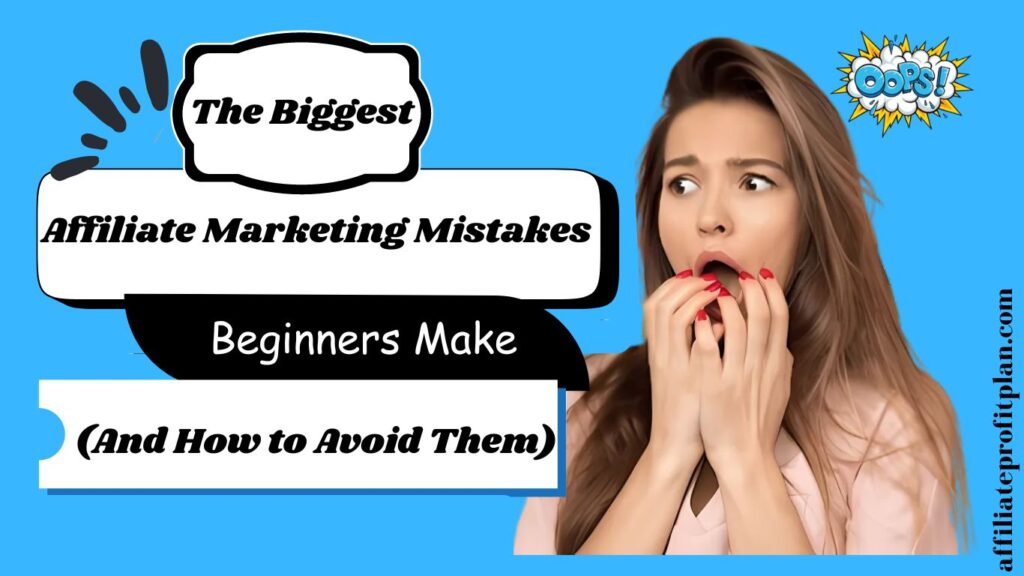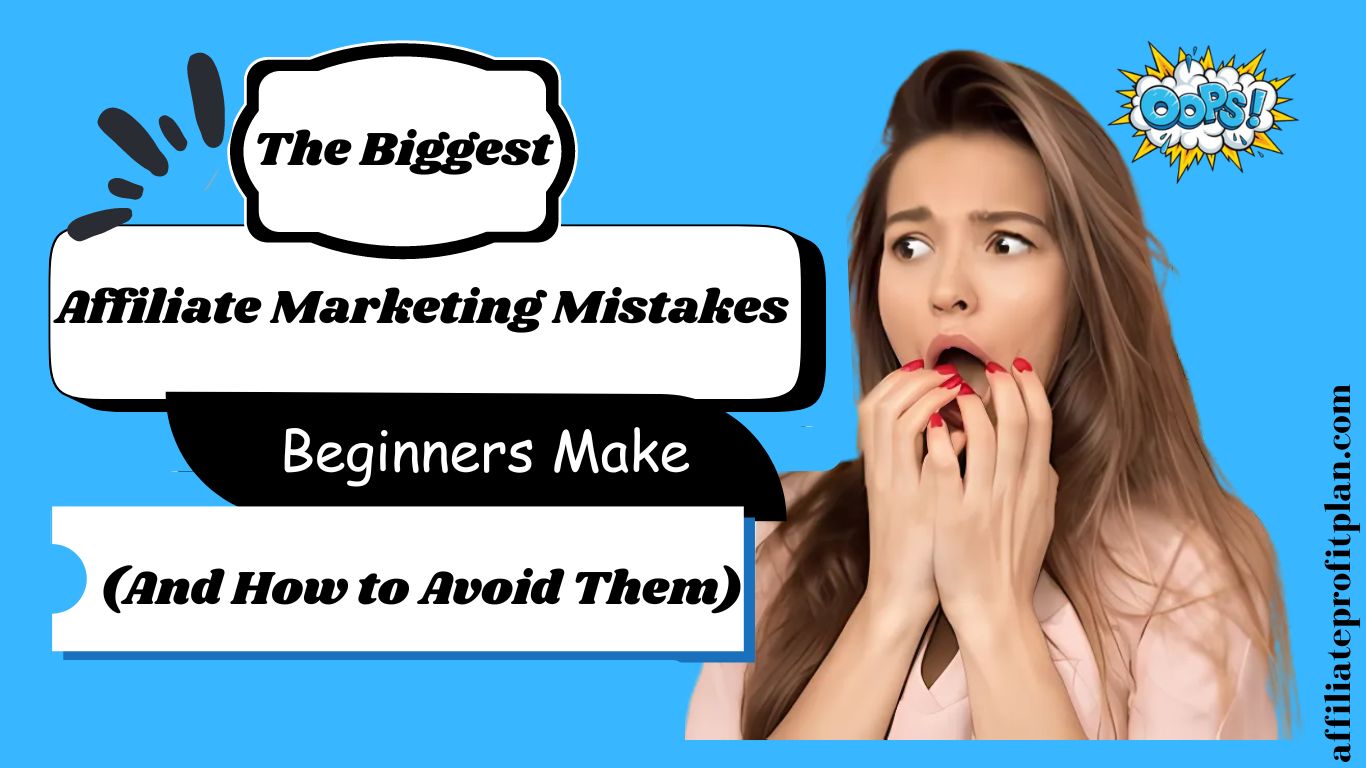Welcome to my article The Biggest Affiliate Marketing Mistakes Beginners Make (And How to Avoid Them). Affiliate marketing might seem like a dream come true. You sign up for a few programs, throw some links into a blog post or on social media, and *bam*—money starts pouring in, right? Well, not exactly. For many beginners, affiliate marketing turns into a frustrating game of “Why isn’t this working?”—usually followed by frantic Googling. Don’t worry, we’ve all been there. In fact, making mistakes is almost a rite of passage when you’re starting out. The good news? You don’t have to make all the mistakes yourself. I’ve rounded up the biggest ones so you can (hopefully) avoid face-planting your way through your affiliate journey.
Now, before you go grabbing every affiliate link you can find, let me save you from the headaches that so many newbies experience. Whether it’s promoting every product under the sun or ignoring that all-important thing called trust, these common missteps can make the difference between earning commissions and just… well, earning crickets. But don’t panic—I’m going to walk you through how to sidestep these beginner blunders and set yourself up for long-term success in the world of affiliate marketing. Trust me, your future self (and your bank account) will thank you!
Access My Proven Blueprint for $50-$100 Daily Income – Watch This FREE Video Now >>>

Promoting Too Many Products Too Soon
When you first dive into affiliate marketing, it’s easy to get a little… overexcited. You’re scrolling through affiliate programs, and suddenly every product seems like a goldmine. Health supplements? Sure! Tech gadgets? Why not! Gardening tools? Let’s add those too! Before you know it, your blog or social feed looks like a digital version of a yard sale—random items scattered everywhere, hoping someone will bite. Spoiler alert: they probably won’t.
The problem with promoting too many products too soon is that you end up diluting your focus—and worse, confusing your audience. People come to your site or social media because they’re looking for specific, helpful information. If one minute you’re recommending high-end cameras and the next you’re pushing pet food, your audience is going to wonder, “Does this person actually know what they’re talking about?” And trust me, once that doubt creeps in, so does the likelihood that they’ll click that sweet affiliate link.
The solution? Slow down and start small. Focus on just a few products that are closely related to your niche and that you genuinely believe in. Not only will this build trust with your audience, but it will also help you create more in-depth, quality content around those products. When you come across as an expert in a specific area rather than a jack-of-all-trades, people are far more likely to take your recommendations seriously—and more importantly, to click “buy.”
Neglecting to Build Trust with Your Audience
If affiliate marketing had a golden rule, it would be this: trust is everything. Imagine walking into a store where the salesperson immediately tries to sell you something without even saying hello. Feels a little pushy, right? That’s how your audience feels when you plaster affiliate links everywhere without first establishing a relationship. Sure, you might be promoting the best product in the world, but if your readers don’t trust you, they’re not going to buy. No trust = no clicks = no commissions. Simple math.
Here’s the thing—your audience isn’t just a faceless crowd; they’re real people, and like any relationship, trust takes time to build. If you jump straight into hard-selling mode without offering value first, it’s like proposing on the first date. It’s awkward, off-putting, and a little too much too soon. People need to feel like you’re genuinely trying to help them, not just cash in on commissions. So, instead of bombarding them with product pitches, focus on creating helpful, informative content that solves their problems. Offer honest reviews, tips, or how-tos that actually benefit your readers, even if it doesn’t lead to an immediate sale.
And here’s a pro tip: transparency goes a long way. Let your audience know upfront when you’re using affiliate links. Be real about your experiences with the products you promote. If something didn’t work for you, say so! Being honest about both the pros and cons of a product can build credibility faster than any sales pitch ever could. Once your readers see that you’re genuinely looking out for them, they’ll trust you—and they’ll be far more likely to follow your recommendations when you do drop those affiliate links.
Not Understanding the Products You Promote
Let’s be honest—there’s nothing worse than promoting something you know nothing about. Yet, it happens all the time in affiliate marketing. You find a product with a great commission rate, slap it into a blog post or a social media update, and hope for the best. But here’s the catch: your audience can tell when you’re faking it. Promoting products you haven’t used or don’t understand is like trying to give directions to a place you’ve never been—you’re going to get people lost, and they’re not going to trust you the next time you try to lead them anywhere.
Access My Proven Blueprint for $50-$100 Daily Income – Watch This FREE Video Now >>>
Promoting a product blindly can hurt your credibility faster than you can say “affiliate commission.” People expect you to know your stuff, especially if you’re positioning yourself as an expert in your niche. If your audience senses that you don’t have firsthand experience or a deep understanding of the product you’re pushing, they’ll look for recommendations elsewhere. And spoiler: they won’t be coming back to you.
So, how do you avoid this rookie mistake? Simple: take the time to actually learn about the products you’re promoting. Ideally, use the product yourself so you can offer personal insights and detailed, honest feedback. If that’s not possible, do your research—read reviews, watch demos, dive deep into product features, and understand both the strengths and weaknesses. This way, when your audience has questions (and they will), you’ll be able to give them genuine, helpful answers instead of generic fluff. Not only does this build trust, but it also makes your content much more engaging and credible.
Ignoring SEO and Content Quality
Let’s be real—no matter how amazing your affiliate links are, if no one can find your content, you’re essentially shouting into the void. That’s where SEO (Search Engine Optimization) comes in. It’s the not-so-glamorous but absolutely crucial part of affiliate marketing. Yet, so many beginners overlook it. They focus on cramming their pages with affiliate links, thinking that’s all it takes. But without good SEO and high-quality content, those links are going to sit there collecting digital dust. And trust me, dust doesn’t pay commissions.
Here’s the deal: Google doesn’t care how many affiliate links you’ve got—it cares about how helpful your content is to people searching for answers. If you’re ignoring SEO and pumping out low-quality content, your page will be buried so deep in search results that not even your mom will be able to find it. On the other hand, if you take the time to research relevant keywords and craft valuable, well-written content, Google will reward you with higher rankings, which means more traffic, more clicks, and more sales.
And content quality? That’s just as important. Think of it like this: would you trust a messy, poorly written article filled with typos and irrelevant information? Of course not. Neither will your audience. Even if your SEO is spot-on, if the content itself is sloppy or unhelpful, people will click away faster than you can say “affiliate commission.” Quality content builds trust (there’s that word again!) and keeps people coming back for more. It’s what sets you apart from the thousands of other sites trying to push the same products. So, instead of rushing to throw together a half-baked blog post, take the time to craft something valuable. Trust me—your audience (and your affiliate earnings) will thank you.
Giving Up Too Soon
Affiliate marketing is a bit like planting a garden. You can’t just throw some seeds in the dirt, water it once, and expect a forest of cash to grow overnight. Yet, so many beginners do exactly that—expect instant results. They sign up for a few affiliate programs, post a couple of links, and when they don’t make a fortune by the end of the week, they throw in the towel. The harsh truth? Affiliate marketing takes time, effort, and a whole lot of patience. Giving up too soon is like bailing on your garden before the first sprout even has a chance to break through the soil.
The biggest mistake here is expecting immediate success. You hear stories about people making thousands of dollars a month from affiliate marketing, and while that *is* possible, it doesn’t happen overnight. It takes time to build an audience, gain their trust, and create high-quality content that actually ranks in search engines. Many people quit right when things are about to get good—if they had just stuck around a little longer, they might have seen those commissions start to roll in.
So, how do you avoid this premature exit? First, set realistic expectations. Understand that affiliate marketing is a long-term game. You might not see results for months, but that doesn’t mean your efforts are in vain. Stay consistent, keep producing valuable content, and focus on growing your audience. Track your progress, make tweaks along the way, and most importantly, be patient. Success in affiliate marketing isn’t a sprint—it’s more like a marathon. And remember, the ones who stick with it are the ones who reap the rewards. Just don’t be the person who quits five minutes before the miracle happens!
Conclusion
Affiliate marketing isn’t some magical “get-rich-quick” scheme—if it were, we’d all be sitting on private islands by now. The truth is, it takes time, effort, and learning from your mistakes. But here’s the silver lining: you don’t have to make all those rookie mistakes yourself. By being aware of the most common missteps—like promoting too many products too soon, neglecting to build trust, or ignoring SEO—you’re already ahead of the game. And let’s not forget about understanding the products you promote (seriously, don’t skip that) and the all-important virtue of patience.
Access My Proven Blueprint for $50-$100 Daily Income – Watch This FREE Video Now >>>
At the end of the day, affiliate marketing is a marathon, not a sprint. So, if you find yourself feeling discouraged, just remember that the people earning big commissions didn’t get there by giving up after a few months. They stayed the course, learned from their mistakes, and kept improving. And guess what? That’s exactly what you’re going to do. Stick with it, keep refining your strategy, and soon enough, you’ll start seeing those results you’ve been working so hard for. Keep calm, stay consistent, and let your affiliate marketing journey unfold—success is closer than you think!
Thanks a lot for reading my article on “The Biggest Affiliate Marketing Mistakes Beginners Make (And How to Avoid Them)” till the end. Hope you’ve helped. See you with another article.










